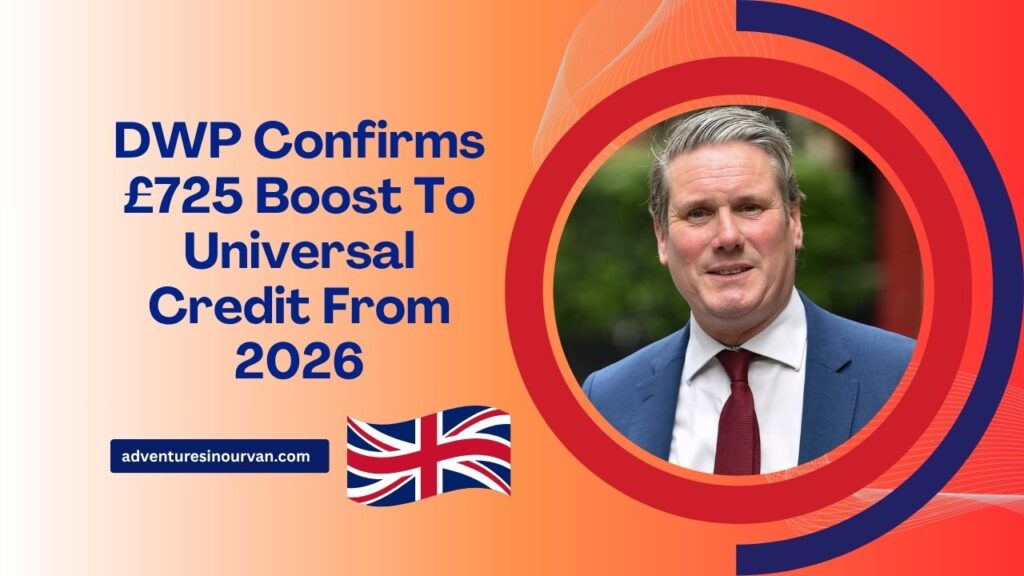The UK government has unveiled a landmark change to the Universal Credit (UC) system. Starting in April 2026, millions of claimants will see a gradual uplift totaling £725 annually by the financial year 2029–30.
The Department for Work and Pensions (DWP) is rolling out this reform as part of a wider welfare overhaul, aiming to better support low-income households amid the rising cost of living.
Let’s explore how this £725 Universal Credit increase will impact you, when it begins, who qualifies, and how the new welfare rules will shape the future of support.
Who Will Benefit from the £725 Universal Credit Uplift?
The main beneficiaries are single adults aged 25 and over, who rely on Universal Credit without receiving additional health-related components. This group will see an additional £725 per year by 2029–30, which is roughly £250 more than what a standard inflation-linked increase would have delivered.
The uplift is part of a phased approach that begins in 2026 and rolls out over four financial years, allowing the DWP to implement it sustainably while still providing targeted support.
Year-by-Year Breakdown of the £725 Universal Credit Increase
| Financial Year | Projected Annual Increase | Notes |
|---|---|---|
| 2026–2027 | £180–£200 | First phase begins |
| 2027–2028 | £360–£400 | Second-stage increase |
| 2028–2029 | £540–£580 | Nearing full uplift |
| 2029–2030 | £725 | Final annual boost achieved |
This schedule helps households plan long-term and provides a real-terms income increase that outpaces inflation projections.
Universal Credit and PIP Bill: What Else Is Changing?
The Universal Credit and PIP Bill introduces major shifts, not just in payment amounts but also eligibility and support services.
Key Features of the 2025 Welfare Reform Package:
- Standard Allowance Uplift: Up to £725 extra per year by 2029–30.
- Health Component Adjustments: New claims after April 2026 will receive £50 per week, down from ~£390/month.
- PIP Eligibility Reforms: From November 2026, new claimants must score at least 4 points in one daily living activity.
- Employment Support: 1,000 new advisers will assist claimants through the Pathways to Work programme.
Changes to LCWRA and PIP Support – What to Expect
| Category | Current Provision | From 2026 Reforms |
|---|---|---|
| UC Health Top-Up (LCWRA) | ~£390/month | £50/week (new claims only) |
| PIP Daily Living Component | Flexible criteria | Must score 4+ points in one activity |
| Existing Claimant Support | Real-terms uprating | Protected—no cuts to existing payments |
| Employment Adviser Access | Limited | 1,000 advisers available nationwide |
Support for New Beneficiaries: How DWP Plans to Assist
To help with these changes, the DWP will assign dedicated work coaches and deploy 1,000 employment advisers nationwide. These advisers will connect claimants with:
- Job opportunities
- Training and skills development
- Local health services
This ensures that the welfare system becomes more active and responsive, aiming for long-term independence over reliance on passive benefits.
Timeline of Changes and Key Dates
- April 2026: Universal Credit uplift begins, health top-up changes take effect.
- April 2027–2029: Continued annual increases in standard allowance.
- November 2026: New eligibility rules for the PIP daily living component go live.
The £725 Universal Credit boost from 2026 is a major financial relief for working-age adults across the UK. Alongside reforms to health-related payments and PIP eligibility, the DWP aims to balance financial support with pathways to independence.
With gradual increases over four years, nearly four million households are expected to benefit, ensuring that rising living costs do not leave the most vulnerable behind.
FAQs
Who qualifies for the full £725 boost in Universal Credit?
Single adults aged 25+ without health-related elements will receive the full £725 annually by 2029–30.
Will existing claimants lose their current health-related payments?
No, those with ongoing health or disability claims will retain their current support with inflation adjustments.
What is changing in the PIP eligibility from November 2026?
New claimants must score at least 4 points in one daily living activity to qualify for PIP support.

